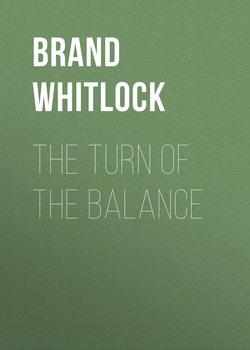Читать книгу The Turn of the Balance - Brand Whitlock - Страница 9
BOOK I
VII
ОглавлениеWard returned to his office and to his work, but all that day, in the excitement on the floor of the exchange, during luncheon at the club, at his desk, in his carriage going home at evening, he saw before him that row of heads–the white poll of old Delaney, the woolly pate of the negro, but, more than all, the brown head of Harry Graves. And when he entered his home at evening the sadness of his reflections was still in his face.
"What's the matter this evening?" asked Elizabeth. "Nerves?"
"Yes."
"Been on the wrong side to-day?"
"Yes, decidedly, I fear," said Ward.
"What do you mean?"
"I've sent a boy to the penitentiary." Ward felt a kind of relief, the first he had felt all that day, in dealing thus bluntly, thus brutally, with himself. Elizabeth knit her brows, and her eyes winked rapidly in the puzzled expression that came to them.
"You remember Harry Graves?" asked her father.
"Oh, that young man?"
"Yes, that young man. Well, I've sent him to the penitentiary."
"What is that you say, Stephen?" asked Mrs. Ward, coming just then into the room. She had heard his words, but she wished to hear them again.
"I just said I'd sent Harry Graves to the penitentiary."
"For how long?" asked Mrs. Ward, with a judicial desire for all the facts, usually unnecessary in her judgments.
"For one year."
"Why, how easily he got off!" said Mrs. Ward. "And do hurry now, Stephen. You're late."
Elizabeth saw the pain her mother had been so unconscious of in her father's face, and she gave Ward a little pat on the shoulder.
"You dear old goose," she said, "to feel that way about it. Of course, you didn't send him–it was John Eades. That's his business."
But Ward shook his head, unconvinced.
"Doubtless it will be a good thing for the young man," said Mrs. Ward. "He has only himself to blame, anyway."
But still Ward shook his head, and his wife looked at him with an expression that showed her desire to help him out of his gloomy mood.
"You know you could have done nothing else than what you did do," she said. "Criminals must be punished; there is no way out of it. You're morbid–you shouldn't feel so."
But once more Ward gave that unconvinced shake of the head, and sighed.
"See here," said Elizabeth, with the sternness her father liked to have her employ with him, "you stop this right away." She shook him by the shoulder. "You make me feel as if I had done something wrong myself; you'll have us all feeling that we belong to the criminal classes ourselves."
"I've succeeded in making myself feel like a dog," Ward replied.
